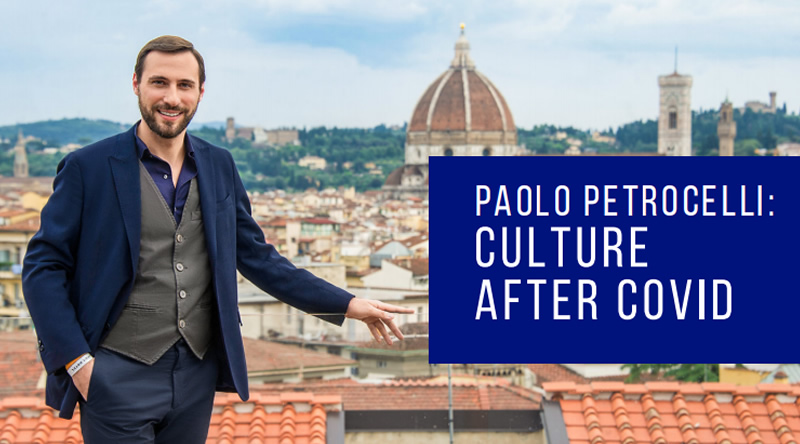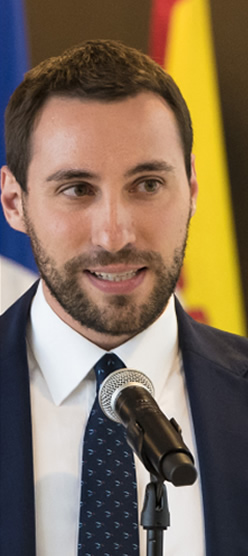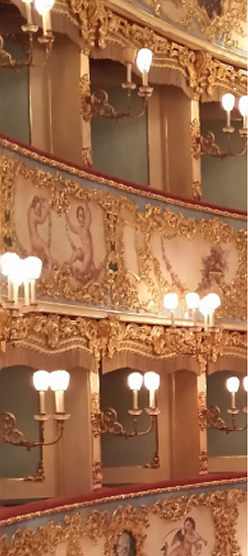
What kind of work do you do? And how has it changed through the pandemic?
I’m a manager in the cultural sector. Specifically, I work in the music field, in classical music and Opera. I’m working and based in Rome. I’m working, of course, for Italian institutions, but I’ve been working for many years now for European and international organizations, also in the Middle East, and specifically in the Gulf region. So every day I try to support opera houses, music, academies, ministries of culture, to develop better strategies for cultural and music initiatives.
During the pandemic, it’s been extremely challenging for the cultural sector to plan and develop business and activities. But also, I think, this is an opportunity to expand the vision of the sector, and try to really come up with some innovative solutions, not just to the current challenges, but also to some historical challenges that our sector has. So this pandemic is actually giving us not just problems, but also I believe, opportunities.

How important is culture to a nation’s economy?
A lot of citizens, but also politicians, and entrepreneurs and managers look at the cultural sector just as the entertainment sector. But we know that the financial impact that culture produces everywhere in the world is so big, and I think that the cultural sector should be able to communicate more clearly the value that it represents not just from a social point of view, but also from an economical point of view.
The pandemic is clearly demonstrating that once you put on hold an entire sector, like the cultural sector, you’re damaging every level of our society, because we know that the cultural sector is positively engaging all the main stakeholders of our society, from citizens to the private sector, from the government to the NGOs and the civic society.
What role can culture play or does culture play in international relations?
Well, of course, it’s a crucial role. We hear more and more about the concept of cultural diplomacy which is a very advanced and sophisticated form of diplomacy and of soft power. So definitely we know that culture has been used over the centuries as a tool to facilitate interaction and collaboration and cooperation between people and countries. And I think that working together on these kinds of programs will give us a lot of new opportunities to not only facilitate political economical interaction between countries and regions of the world, but also it will give a new perspective of how we can develop culture with a very global and international vision.
How has the pandemic impacted cultural activity in the past year?
Beside all the criticalities, of course, trying to see the positive aspect we realize that technological innovation is not something that you can actually implement quickly on a large scale. We realized that we were thinking within our museums, theaters, concert halls, opera houses, that innovation was to have a very nice website, or have a very good social media manager in the team. Of course this is not enough at all, but actually, we realized that we need to work on serious investments, especially on the digital infrastructure.
Most of our theaters, museums and cultural venues around the world – especially in Europe – they don’t have a serious and appropriate digital infrastructure. So we need investments, we need a strategy, but we also need expertise and skills. That’s why we weren’t able to react promptly in going online.
Of course, everyone did their best, but the answer is not just going on YouTube or Facebook. With the live streaming performance, you really need to develop a cultural program, a digital cultural program, which is a little something a little bit different from just filming what you are doing in a normal season, for instance.

Any countries whose cultural sectors have done better than others worse than others through this?
If we see the two big blocks of US and Europe, you can clearly understand the consequences of the pandemic in the US where you have a system which is strongly supported by the private sector. Broadway is completely shut down, and all the major cultural organizations are basically in standby, because they usually count on strong support from the private sector. And now the private sector has different kinds of priorities.
Of course, in Europe, the system is completely regulated in a different way, the state or the governments are actually supporting most of the financial needs of the cultural organizations. So, let me say that for once the European system demonstrated to be more healthy from a certain point of view. In the Middle East, there is a kind of mix of government and private support to the cultural sector. Of course, everything was also affected there, the same as in Asia.
What long term impact on culture do you think that the lockdown might have even when everything kind of is allowed again?
We are all expecting a big boom of the live events once this will be possible, so from the ticket office point of view everyone is very, very positive. At the same time, I think that every citizen of the world is really going to have different kinds of needs, in terms of a cultural event, we are all expecting something very meaningful and excellent. We don’t want to waste time or money or energy in something that is not really making a difference. So we will I think be much more selective in what we are going to do during the next few years. And I think that this kind of approach from the audience will make an impact on the cultural sector and we will have to be much more committed to offer really, really great cultural projects and initiatives. This is my hope, at least. Also we will be much more careful about investing a lot of money in big productions and big projects, everything will have to be much more considered and valued.
Do you think everything there will, potentially every live event will have some kind of digital platform?
From now on, it will be very strange if you don’t have these kinds of facilities. I think that this is going to really change how we plan and we create the strategy for our cultural projects. We will always have to think, well there might be someone that is not going to be there, and we also want to give them the opportunity to have this kind of experience.
How important do you think physical spaces and venues are to the cultural life of a city or a country?
I think that many cultural organizations will work to rediscover their social mission. So that cultural venues are not just a place for performance, but really the key venues of a community now, where people can actually meet, interact, share emotions, ideas, not just around the performance but around an idea of culture. And this is something that I think we were losing, over the last few years, especially here in Europe where some theatres or concert halls were actually missing this kind of social role. So I think that we’ll have to rediscover and rethink, at least partially, how we use these spaces to really make these theaters and concert halls and museums much more inclusive and open.
How do you think the virtual experience compares with the in person experience?
We clearly realize that it is almost impossible to reproduce the live experience in the digital way. But this is the point, we need to look at the digital as an opportunity to do something more and eventually different from what we are going to do as a live experience. So again, it doesn’t really make sense, for instance, to make an opera of three hours streamed digitally, because we are just not interested in staying in front of a laptop for three hours looking at an opera. I think that the live experience will always have its dimension of uniqueness, and that the digital event will have to really find its own identity, which from my point of view is not just about live streaming. It’s an opportunity to expand the artistic languages. So what you can do on digital is sometimes impossible to do in the real world.
Do you have any particular favorite cultural venues or spaces around the world?
Some of the Italian opera houses and the Opera House in Paris are such special, special venues where you can really breathe a lot of history and heritage. I’m very inspired by the new performing arts centers that have been built in the Gulf region over the last few years.
If I think about Dubai or Qatar, they are so inspiring from many points of view, and it’s very interesting as an Italian, a European, to see how we can actually envision a new opera house in 2021. Now we can really create futuristic performing arts centers – something that might be very difficult to find in Europe, but these countries are creating the cultural ecosystem and we have proof of what architecture and engineering and design can really come up with.
What are some of the cultural projects or new venues or new work that you’re looking forward to?
I’ve just been appointed a few months ago as Director General of one of the historical music academies in the city of Cremona. And in Italy, Cremona is so famous all around the world, because it’s the city where the violin was created. So there is this very, very historical tradition of utility. It’s a great opportunity for me as a manager to try to innovate and develop such an historical music academy that is working with the top young talents coming from all over the world to improve their skills as soloists as musicians.
And it’s a great opportunity to understand how an academy for higher education in such an historical city of Pomona could actually look into the future and project itself into the future. What does it mean today to help young talents that are working on a classical music field to really be successful as artists, but also let me say as human beings because what does it mean today to be an artist? What is exciting is the connection between the past, the present and the future, between the tradition and innovation.
Follow Paolo’s work at PaoloPetrocelli.com.
